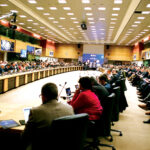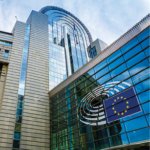
In 2003, China committed to investing €200 million (US$270 million) for the privilege of participating in the development of Europe’s Galileo program. But by 2007 it had been forced out of major decision-making because of security concerns and the collapse of the original financing plan for the program, which was to include public and private money.
In 2003, China committed to investing €200 million (US$270 million) for the privilege of participating in the development of Europe’s Galileo program. But by 2007 it had been forced out of major decision-making because of security concerns and the collapse of the original financing plan for the program, which was to include public and private money.
At the time, bringing China into Galileo was seen by some as simply an anti-American gesture on the part of the Europeans, while others have argued that they truly thought China’s membership in Galileo would help European companies to gain a strengthened commercial position in the Asian nation’s huge and growing market.
In any case, China’s contribution to the program ultimately turned out not to include a policymaking role, and who could then blame officials there for feeling badly used — perhaps even humiliated — after having paid for the privilege of joining the Galileo consortium as a partner only to see themselves shut out of its governing bodies?
Seeking a New Path
This problematical history seemed ripe for review at a recent European Institute for Asian Studies roundtable event in Brussels that brought together representatives of the European Commission (EC), the European Space Agency (ESA), and the Chinese Aerospace Science and Technology Corporation (CAST) to discuss EU-China relations in space. (CAST is a state-owned company that serves as the main contractor for China’s space program.)
But satellite navigation received only a grudging and oblique treatment at the event.
The “EU-China Galileo fiasco,” as some have gone so far as to refer to it, turned out to be the elephant in the room that no one wanted to see or touch, at least none of the panelists. This despite the fact that the title of the conference itself —“The Ups and Downs of Euro-China Space Cooperation” — might have led some of the attendees to expect a few words on the subject.
However, Hartwig Bischoff, Space Unit policy officer at the EC’s Directorate-General for Enterprise and Industry, started the ball rolling in a very different direction. Emphasizing that he was there to discuss EU-China co-operation in research, Bischoff laid out the Commission’s plans to launch a new “space dialog” with China, listing a number of wide ranging potential topics for discussion, including remote sensing, climate change, exploration of the solar system, space weather, space and life sciences, space debris, et cetera, et cetera.
Satellite navigation, however, was not on Bischoff’s list. Later in his presentation he showed another list, this time representing ‘opportunities’ for EU-China cooperation. Once again, GNSS-related matters were notable by their absence.
When asked later about these omissions, Bischoff replied that satellite navigation was not on his lists because he was there to talk about cooperation in research, and Galileo is an operational system, not a research project.
Oka-a-y. Awkward pause and perplexed looks passing among the panelists.
A growing suspicion arose that perhaps no one was at the roundtable to talk about the “downs” mentioned in the conference title. No one, that is, except for the man who got the party together in the first place: David Fouquet, a senior associate at the European Institute for Asian Studies who conceived the event and acted as a sort of moderator. Fouquet said point blank that he wanted to hear more about the lingering effects of the EU-China falling out over Galileo.
After this direct prodding, Gongling Sun, chief representative of CAST’s European office, made an attempt to address the subject. He was brief and, by his comments and “body language,” seemed to want to minimize any sense of hard feelings, or indeed any feelings at all.
“As for our participation in the Galileo project,” he said, shrugging his shoulders, “we were invited, and then we were uninvited. And that’s the way it is. We just keep our heads down, we stay quiet, and we keep on going.”
And keep going they have. By 2009, while Galileo was falling behind schedule, the Chinese had moved forward and were making rapid progress in the development of their own Compass (BeiDou-2) system. What’s more, China had announced its plans to transmit signals on the wavelength that the Europe wants to use for Galileo’s Public Regulated Service (PRS), an encrypted frequency for governmental, immigration, public safety, and potentially military use.
“It’s incredible,” said Jean-Michel Fobe, anticipating the direction of the conversation before the presentations had even started. Fobe is President of Belgium’s Eutralex Aerospace and a man with some experience working with Chinese collaborators.
“The Chinese government sets its priorities and makes the decisions, and that’s all there is to it,” Fobe added. “There is no argument, no negotiation. It’s not like here in Europe where 27 different opinions have to be brought together before we can do anything.”
The price of pan-European democracy? China pays no such price. Today BeiDou, not Galileo, could well become the third fully operational global satellite navigation system, after GPS and GLONASS. Despite years of effort, negotiations to resolve the signal overlap question have made little progress. As recently as last year, EC officials said that the issue represented “a major problem for the security of the EU.”
Invited speaker Brian Weeden, who spent nine years as an officer in the U.S. Air Force and worked at the U.S. Strategic Command’s Joint Space Operations Center, chimed in on the subject.
“China does not recover easily from slights, often reacting in a calculating manner,” he said bluntly, suggesting that the BeiDou/Galileo PRS frequency overlay issue was just another example of China’s grudge-holding, a well thought out and pointed reaction to not getting the value they expected out of the aborted Galileo deal.
ESA’s Not So Eloquent Silence
For his part, ESA representative Karl Bergquist had little to say about the EU-China and Galileo story. Asked what he understood to be the current state of affairs regarding China’s planned overlay on PRS, Bergquist pled ignorance.
“I don’t really know,” he said. “I don’t know what happened with that story. We were all sort of following it a few years ago, but now, no one talks about it any more.”
Perhaps it’s a question better posed to the technicians, he suggested, whom he could not name and of whom he is not one.
Bergquist has worked as an administrator in ESA’s International Relations Department since 1993. He holds a degree in Chinese from the Language Institute of Beijing and is currently in charge of ESA’s relations with China, Russia, and Israel.
All of which makes it a bit surprising that, sent by ESA to address the ups and downs of EU-China cooperation in space, he would have had so little to say — nothing at all, actually —about EU-China cooperation on GNSS.
Perhaps what this really tells us is something about the determination with which ESA would like to leave behind — and get everyone else to leave behind — the entire story of Galileo’s China venture. After all, what is the point of rehashing that old sordid affair? This kind of conference should be about the future, right?
Wider Consequences
In the wake of this less-than-successful GNSS cooperation, when China picked up its stuff and went home, it didn’t just take away the Galileo stuff. The EC’s Bischoff acknowledged that the unfortunate turn of events had resulted in a slump in the EU-China’s relationship across all fronts.
Still, he insisted, the tide has now turned. “There was an effect,” he said, referring to decreased Chinese participation in EU research across the board, “but we feel that we are now coming back and that things are on the up.”
Weeden was frank in his assessment of the European and American positions.
“The Europeans are still trying to figure out who they want to be in space,” he said. “Does Europe want to be a junior partner, contributing what it can and benefiting from its relationships with the big players? Does it want to be a global player in its own right, standing on an equal footing with the US, Russia, and China? Or is it aiming to be a facilitator, bringing parties together who would not otherwise meet?”
Bischoff pointed out that the EU, through its Research Framework Program, does represent a kind of workaround for third parties, already playing the facilitating role described by Weeden.
“We have EU-funded projects with third-country partners,” Bischoff explained, “with the U.S. for example, with Russia and with China. According to their own rules and regulations, our U.S. partners are often not supposed to work with Chinese organizations. And the Chinese may not be allowed to work with the Americans, but they can both work with us.”
And this means, de facto, they are in some cases working together within an EU-based framework. Could this be a way to bring the competing GNSS systems together, on neutral EU soil?
Again Weeden: “Everyone agrees that international cooperation is needed, but the opportunities for the EU are made greater by the fact that the U.S. withholds its own co-operation.”
Does China Really Care?
The rules and regulations to which Bischoff was referring include the International Traffic in Arms Regulations (ITAR), a set of U.S. government regulations that control the export and import of defense-related articles and services. ITAR essentially locks China out of any exchange of sensitive U.S. information, equipment, and systems, including most anything related to GNSS.
Always controversial, ITAR continues to stimulate heated debate in U.S. halls of power. As reported in last month’s edition of Inside GNSS, a U.S. Satellite Export Policy Report, submitted to Congress last April by the Department of Defense and the Department of State, recommended that restrictions on the export of communications and remote sensing satellites be eased, to improve the competitiveness of U.S. companies. However, the report recommended retaining controls on spacecraft technologies used for positioning, navigation, and timing, including GPS.
Weeden pressed his case against what he considers the failed policies of his own country. “With respect to U.S.-China relations, ITAR is a failure,” he said. “It did not help US industry; it has hurt US industry. The withholding of information and cooperation has not brought China to its knees.”
Sun appeared to agree.
“Look,” he said, “let’s take the airline industry — in China we have no major manufacturer of airplanes. So, we have a choice to make: we can buy Boeing airplanes or we can buy Airbus airplanes. If Boeing doesn’t want to sell us their airplanes, then we have to buy Airbus airplanes. It doesn’t make much difference to us. They both make very good airplanes.”
The simple message and the simple truth: China doesn’t need the United States when it has Europe as a trading partner. Does that make Europe a saboteur of U.S. policy?
Sun didn’t put it in those terms; he didn’t even appear to want to suggest it, but the result is the same. U.S. policy that closes its doors to Chinese trade in strategic industries only serves to open doors for other global players like Europe. It certainly does not hurt China. And if China can’t buy what it needs — not from Europe, not from the United States, not from anyone — it simply develops what it needs from scratch.
And, if we are to credit that Department of Defense/Department of State report, China is also not above using “any means necessary,” including its intelligence services and “other illicit approaches,” to get around those pesky U.S. rules and regulations.
In the roundtable, Weeden extended his critique of ITAR, applying it to GNSS matters and beyond. “First, as I said, it has hurt U.S. industry; second, it didn’t stop China from moving straight ahead and putting an operational satellite navigation system into orbit; and third, it has had no effect on China’s behavior with respect to human rights.”
Sun appeared to grimace and shifted in his seat. Perhaps he was thinking to himself something like, “Here we go again,” but that’s just a supposition — he said nothing.
Outlook or Look Out?
The bottom line is that while Europe may have thought it was keeping a strategic edge when it decided to leave China out of Galileo’s inner circle, just as the United States believes ITAR enables it to maintain its own strategic edge, neither has succeeded. China has simply gone on doing what it seems to do best — powering past all obstacles with a steadfast determination and clearly perceived goals, no matter what anyone else says or thinks.
Offline conversations suggest that talks about their respective GNSS programs are still going on between the European Commission and Chinese authorities, possibly involving the EC’s Head of Space Activities Paul Weissenberg at DG Enterprise and Industry, with perhaps two or three meetings a year. But what exactly they are saying to one another is a closely held matter. In all likelihood China is now feeling the strength of its upper hand and enjoying Europe’s weakened arguments about partnership and mutual interest.
What can we actually say about the future of European and Chinese GNSS? Both BeiDou and Galileo will be fully operational satellite navigation systems. Nothing can stop either of them now. They will coexist, along with GPS and GLONASS.
Ultimately, they will have to live together. After all, the EU and China sit together on the Providers Forum of the International Committee on GNSS and the ICG’s working group on compatibility and interoperability.
Judging from the buzz among conference participants over a sumptuous buffet lunch, many people are still waiting for concrete answers to the question of just what that coexistence will ultimately look like. Until then, the uncomfortable questions, awkward pauses, and perplexed looks are likely to continue.






